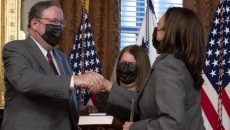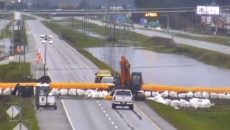By early next week, Canadians and all other foreign visitors who travel to the United States by air will need to get a COVID-19 test no later than 24 hours before their departure.
U.S. President Joe Biden is slashing the current 72-hour testing window for fully vaccinated travellers as part of a suite of public health measures aimed at slowing the spread of the highly mutated Omicron variant.
"We're pulling out all the stops to get people maximum protection from this pandemic," White House press secretary Jen Psaki told a briefing Thursday in advance of Biden's afternoon announcement.
"Our view and belief, and the belief of our medical team, is that we have the tools to keep people safe. We're executing on a robust plan that builds off of all the actions we've taken to date — we are not starting from scratch here."
A White House background memo makes no mention of land borders, or whether fully vaccinated Canadians who drive south would be required to show a test result. Currently, no such test is required to cross into the U.S. by land.
Martin Firestone, a travel insurance broker in Toronto, said he's been run off his feet in recent weeks as clients seek clarity on the ever-changing constellation of travel rules — and he expects that to continue given the latest changes.
Firestone said he's already heard from clients who say they're having trouble finding an affordable antigen test that has a turnaround time of less than 24 hours, forcing them to pay a premium for quicker testing options.
"They called Shoppers (Drug Mart) … and they say they can't get it back to you quick enough that you'll have it guaranteed for sure before you hop on an 8 a.m. flight," Firestone said.
"So they're being forced to go to private health clinics where the cost of a rapid test, to get it back in 15 minutes, is $350, if you can believe it."
Psaki was asked Thursday about the potential challenges of a 24-hour window and said the White House is taking the issue under consideration, but couldn't say immediately whether there would be any exceptions.
She also pointed out that there are still more questions than answers about the dangers of Omicron, making it difficult to anticipate future changes to international travel restrictions.
"I wouldn't expect the lifting of restrictions before we know more about the variant," Psaki said.
"We will continue to evaluate if additional restrictions need to be put in place. None of these are meant to be permanent. None of them are meant to be a punishment. They're all put in place to protect the American people, to hopefully save more lives."
The rise of Omicron marks only the latest twist in the long road back to some semblance of normality for people who routinely travel back and forth between the two countries.






